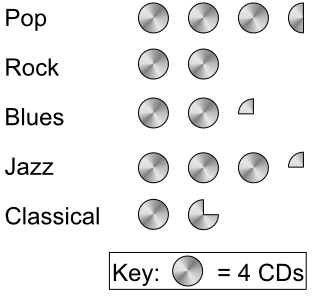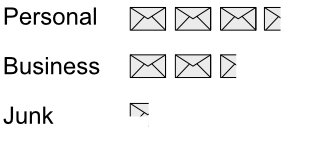A Pictogram uses simple pictures to represent data. The total number of items in a set of data is shown by a number of pictures, where each picture represents one or more items.
An individual picture can be subdivided. If a picture represents four items, then a quarter of a picture represents one item.
A pictogram will always have a key, which indicates how many items each picture on the pictogram represents.
The pictogram shows the number of CDs sold at a charity event. How many pop CDs were sold?

Each CD is worth 4. There are three full and one `frac(1)(2)` CD.
4 x 3`frac(1)(2)` = 14 CDs
Answer: 14
The pictogram shows emails received over a day. The key to the pictogram has been left off the diagram. How many emails does each envelope represent, if 28 personal emails were received?

3`frac(1)(2)` envelopes = 28 emails
Let `x` = number of emails in an envelope
Change 3`frac(1)(2)` to a top-heavy fraction = `frac(7)(2)`
`frac(7)(2)``x` = 28
`x` = 8
Answer: 8